Obama at Hiroshima: What to watch for
Story highlights
- The President is expected to address nuclear proliferation
- Despite the visit, there are still lingering resentments by the Japanese
Shima, Japan (CNN)Seven
decades after the U.S. launched an atomic attack in Hiroshima,
President Barack Obama will become the first sitting president to visit
the city Friday, traveling there to offer a reconciliatory balm for the
still-painful knowledge of the devastation countries can inflict upon
one another.
By visiting
Hiroshima, Obama is casting the powerful presidential spotlight on the
haunted memories of one of history's darkest days. He also hopes to
remind the world that nuclear weapons remain a global threat when placed
in the wrong hands.
Obama arrives in the southern Japanese city late afternoon Friday, with plans to lay a wreath at
the saddle-shaped cenotaph in the Peace Memorial Park before delivering
short reflections. From a distance, Obama will take in the iconic
A-bomb dome, a building skeleton that's come to represent the scale of
destruction the bomb imparted.
He's
also expected to meet some survivors of the blast, most of whom were
young children at the time their city was destroyed and at least 140,000
lives were lost. It wasn't yet clear, however, the extent to which Obama would interact with the Hibakusha survivors, many of whom made loud calls for a presidential audience.
Obama's subdued trip to Hiroshima is expected to last less than three hours.
Reasons not to apologize
Officials say Obama won't apologize for the decision to use an atomic bomb,
which many historians insist was necessary to hasten the end of World
War II and save lives. Nor will Obama re-litigate the decision to drop a
second bomb days later in Nagasaki, where tens of thousands more died.
Such
an apology would ripple to the U.S., likely igniting a political
firestorm on the home front in the midst of the presidential race. And
in countries like China and Korea, where populations were also wiped out
during World War II, demands for apologies from wartime foes would only
increase.
Even as Obama planned
his visit, families of the tens of thousands of Koreans who were killed
in Hiroshima and Nagasaki demanded separate recognition from the
American president.
Obama
said Thursday he hoped to mark Hiroshima as a history-altering moment
-- the U.S. is the only country to have ever used a nuclear bomb -- that
humanity must avoid repeating.
"The
dropping of the atomic bomb, the ushering in of nuclear weapons, was an
inflection point in modern history," Obama said during a news
conference at the G-7 Summit in Japan.
"It
is something that all of us have had to deal with in one way or the
other," he added. "Obviously, it's not as prominent in people's thinking
as it was during the Cold War, at a time when our parents or
grandparents were huddling under desks in frequent drills. But the
backdrop of a nuclear event remains something that I think presses on
the back of our imaginations."
For
Obama, the visit to Hiroshima comes in the last year of a presidency
intent on easing longstanding bitterness directed toward the U.S. Visits
to Cuba, Vietnam, and Argentina all came with messages of
reconciliation and outreach to a younger generation unencumbered with
decades-old enmity toward America.
The
presidential visit to Hiroshima also takes place after Japan and its
Asian neighbors have worked to come to grips with painful wartime
brutalities that Japan inflicted upon its enemies, including an apology
by Japan for the use of Korean sex slaves during the World War II.
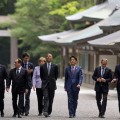
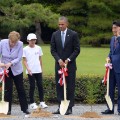
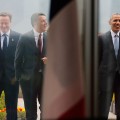
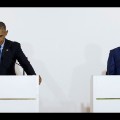
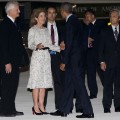
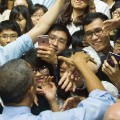

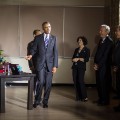
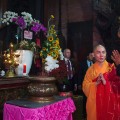
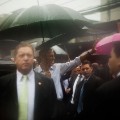
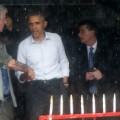

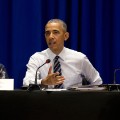
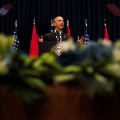
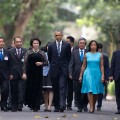
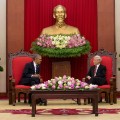
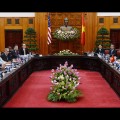
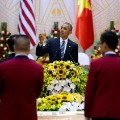
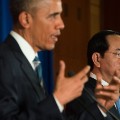
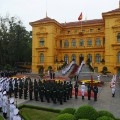
A world without nukes?
Obama
further hopes his appearance at the site will serve to reinforce his
bid to reduce global stockpiles of nuclear weapons, an effort that's had
only moderate strides after seven years in office.
While
he successfully negotiated a deal for Iran to curb its nuclear program,
North Korea only seems more intent on ramping up its own. And Obama has
been accused of hypocrisy for his proposed trillion-dollar overhaul of
American's own nuclear weapons program.
Even
as Obama prepared for his stop in Hiroshima, long-simmering resentments
boiled at the persistent U.S. military presence in Japan. At a joint
press conference late Wednesday, Prime Minister Shinzo Abe of Japan
railed against an alleged murder committed by an American civilian
worker stationed on Okinawa, the southern Japanese island that houses a
massive U.S. military presence.
Abe
said he "protested sternly" over the incident during talks with Obama
ahead of the G-7 Summit, held at a remote luxury hotel overlooking Ago
Bay in southeastern Japan.
Japanese resentment, no visit to Pearl Harbor
The
bitterness among Japanese over the U.S. bases in Okinawa have
persevered for decades, borne from the installation's origin after
Japan's defeat in World War II, which led to American responsibility for
Japan's defense. Abe was intent this week on demonstrating his fury
over the murder, and ensuring that Obama was reminded of the lingering
disputes.
Abe's protestations --
unusually blunt for a presidential news conference -- had the effect of
making Obama apologize to Japan for the murder, even if that apology
wasn't meant as a blanket regret for all of the U.S. military's
incursions in the country.
Concerning
Hiroshima, Abe said he was looking for Obama to "express the feelings
of sorrow" at the Peace Memorial Park, where the President will tour
alongside his Japanese counterpart.
But
Abe said he had no firm plans to visit Pearl Harbor, in Hawaii, where
Japanese planes conducted a surprise morning attack on a U.S. naval
installation in 1941.

















































No comments:
Post a Comment